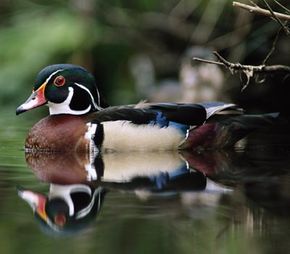Quck answer
Ducks float due to a combination of their waterproof feathers, air pockets in their body, and the shape of their bodies. The feathers on a duck’s body are coated in an oil that repels water, keeping the duck dry and buoyant. Additionally, ducks have air pockets in their bodies that help with buoyancy. Finally, the shape of a duck’s body is designed to displace water, making it easier for them to float. This is important for ducks as they spend a lot of time in bodies of water in search of food and safety.
Wild Animals

Oh, duckies, how do you do it? Find out more about these birds in our picture gallery.
Tim Fitzharris/Getty Images
In 1992, a cargo ship spilled a bunch of little yellow rubber duckies into the Pacific Ocean, and many of them are still out there, floating along the ocean currents. These bathtub toys are made of rubber and filled with air, making them much less dense than seawater and allowing them to float easily. But how do real ducks, made of flesh and blood, manage to achieve the same feat?
To understand how anything floats, you have to understand the concept of buoyancy. When an object weighs less than the amount of water it displaces, it floats. If it weighs more, it sinks. Rubber duckies, which weigh only about 5 grams and take up 75 cubic centimeters of space, displace 75 grams of water. This means that the denser seawater holds them up.
Real ducks also weigh less than the water they displace, but it’s a bit more complicated than just rubber and air. Their buoyancy is achieved through a combination of factors, which we’ll explore next.
FAQ
1. How do ducks float?
Ducks have a special adaptation that allows them to float effortlessly on water. Their bodies are covered in waterproof feathers that are tightly packed together, creating a barrier that prevents water from getting to their skin. This means that their feathers stay dry and they remain buoyant on the water’s surface.
2. Do all ducks float?
Yes, all ducks have the ability to float due to their waterproof feathers. However, some species of ducks are better adapted to swimming and diving than others.
3. How do baby ducks float?
Baby ducks, or ducklings, have a similar adaptation to their adult counterparts. Their soft, downy feathers are coated in a special oil that is produced by a gland near their tail. This oil repels water and keeps the duckling afloat, just like the feathers of an adult duck.
4. Can ducks drown?
While ducks are excellent swimmers and are generally very comfortable in the water, they can still drown if they become exhausted or trapped underwater. However, this is quite rare and most ducks are able to avoid such situations.
5. How do ducks stay warm in the water?
Ducks have a layer of fat just beneath their skin that helps to insulate them and keep them warm in cold water. They also have a counter-current heat exchange system in their legs that helps to conserve body heat by recirculating warm blood back to the body.
6. How do ducks clean themselves?
Ducks use their beaks to preen and clean their feathers. They spread oil from their preen gland onto their feathers, which helps to keep them waterproof and clean. They also use their beaks to remove dirt and debris from their feathers.
7. Can ducks swim in polluted water?
Ducks are able to swim in polluted water, but it can be harmful to their health. Polluted water can cause skin irritations and infections, as well as respiratory problems. Ducks are also at risk of ingesting pollutants when they eat food from polluted water sources.
8. How fast can ducks swim?
The speed at which ducks can swim varies depending on the species. Some ducks are able to swim at speeds of up to 25 miles per hour, while others are slower and more maneuverable in the water.
9. How long can ducks stay underwater?
The length of time that ducks can stay underwater varies depending on the species and the individual duck. Some ducks, like the mallard, can stay underwater for up to 20 seconds at a time, while others can stay submerged for several minutes.
10. Can ducks fly when their feathers are wet?
Ducks are able to fly even when their feathers are wet, but it is more difficult for them. Wet feathers are heavier and less aerodynamic, which makes it harder for ducks to take off and fly. However, if they need to escape danger or find a new source of food, ducks will still attempt to fly even with wet feathers.





Leave a Reply